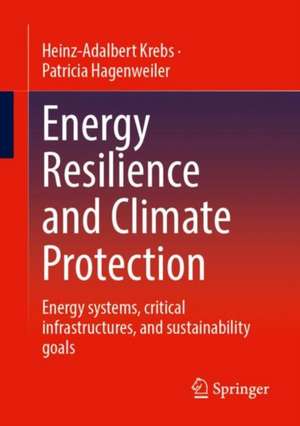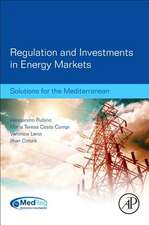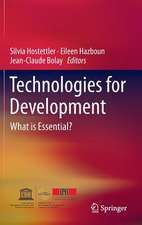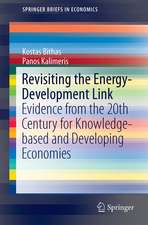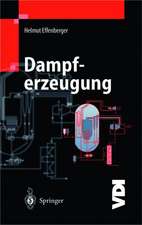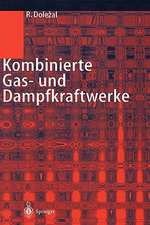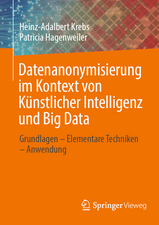Energy Resilience and Climate Protection: Energy systems, critical infrastructures, and sustainability goals
Autor Heinz-Adalbert Krebs, Patricia Hagenweileren Limba Engleză Paperback – 27 mai 2022
Preț: 490.56 lei
Preț vechi: 577.13 lei
-15% Nou
Puncte Express: 736
Preț estimativ în valută:
93.88€ • 97.89$ • 78.02£
93.88€ • 97.89$ • 78.02£
Carte tipărită la comandă
Livrare economică 21 martie-04 aprilie
Preluare comenzi: 021 569.72.76
Specificații
ISBN-13: 9783658375638
ISBN-10: 3658375639
Pagini: 108
Ilustrații: XVI, 108 p. 1 illus.
Dimensiuni: 148 x 210 mm
Greutate: 0.18 kg
Ediția:1st ed. 2022
Editura: Springer Fachmedien Wiesbaden
Colecția Springer Vieweg
Locul publicării:Wiesbaden, Germany
ISBN-10: 3658375639
Pagini: 108
Ilustrații: XVI, 108 p. 1 illus.
Dimensiuni: 148 x 210 mm
Greutate: 0.18 kg
Ediția:1st ed. 2022
Editura: Springer Fachmedien Wiesbaden
Colecția Springer Vieweg
Locul publicării:Wiesbaden, Germany
Cuprins
Introduction.- Energy Transition and Climate Change.- Risk Factors of the Power Supply.- Emergency Planning Power Failure.- Resilience measures.- Resilience in Smart Cities.- Conclusion and Outlook.- Bibliography.
Notă biografică
Dr. Heinz-Adalbert Krebs is managing partner at Green Excellence GmbH advising companies especially in the energy industry supporting software implementations, business process optimization, information security and data protection. In addition, he regularly teaches the implementation of ERP systems (SAP) at the Department of Information Systems at the University of Kassel and is a certified data protection officer as well as ISO 27001 lead auditor.Dr. Patricia Hagenweiler is a longterm employee of Green Excellence GmbH and a certified data protection officer.
Textul de pe ultima copertă
The increasingly interconnected, fast-moving, unmanageable and unpredictable world brings with it an unprecedented variety of known and as yet unknown challenges and risks. Some of the global risks have a direct impact on critical infrastructures as well as those of energy supply in particular. A high level of functionality of critical infrastructures (CRITIS), which include the sectors of energy, information technology and telecommunications, transportation and traffic, health, water, food, finance and insurance, government and administration, as well as media and culture, is indispensable for a modern industrial society. In the context of the Corona crisis of 2020/2021, the worldwide inadequate preparation for pandemics became obvious, although the probability of epidemic outbreaks and their global spread has increased significantly in recent decades and was thus predictable to a certain extent. Moreover, it has been shown that in a globally interconnected world, complex crisis phenomena can mutually amplify and thus escalate within a short period of time. In particular, the deficits in preparedness for major risks that became apparent in the course of the Corona pandemic cannot be managed by nation states alone, especially since the probability of such events has risen continuously in recent decades and will continue to increase with growing globalization and urbanization and, in particular, as a result of climate change and its consequences. This publication addresses the challenges of energy resilience and climate protection, which will require immense attention in the future.
Caracteristici
Energy resilience and climate protection based on many years of experience Anticipation of the effects of inadequate climate protection on the environment and society Monitoring the environmental footprint of the energy industry at all stages of the value chain
